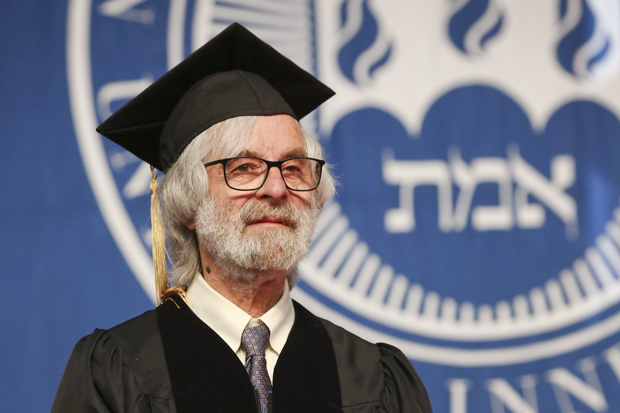Computer scientist Leslie Lamport to grads: If you can’t write, it won’t compute
He exhorted graduates in the sciences and mathematics to find new modes of communication

Renowned computer scientist Leslie Lamport, MA’63, PhD’76, delivered the address at the Brandeis School of Science diploma ceremony on Sunday, reminding graduates of the importance of “great writing” and urging them to search for new ways to convey ideas.
Earlier in the day, the alumnus celebrated as “the father of principled distributed computing” received an honorary Doctor of Science from his alma mater for his contributions to computer science. Lamport earned his master’s degree and doctorate in mathematics from Brandeis.
“With so many people doing so much writing, great writing is hard to find,” he told several hundred people in Shapiro Gymnasium. “I’m tired of reading email that I assume is in English only because I know the sender, and papers in which any attempt to arouse interest seems to have been ruthlessly suppressed.”
Even in technical fields, persuasive, interesting writing is necessary to achieve success, Lamport said.
“If you succeed in attaining a position that allows you to do something great, if you do something that really is great, and if you realize that it’s great, there’s still one more hurdle: You have to convince others that it’s great,” he told the graduates. “This will require writing.”
He exhorted graduates in biological physics; chemistry; computational linguistics; computer science; language and linguistics; mathematics and physics to find new modes of communication.
“There must be wonderful ways in which a writer can interact with the reader that no one has thought of yet, ways that will convey ideas better and will make reading fun,” Lamport said. “I want you to go out and invent them.”
In a lighthearted address laced with humorous observations and anecdotes, the 2013 winner of the A.M. Turing Award (the Nobel Prize of computing) alternately poked fun at himself and the eight-minute time limit he had been given to speak to the graduates.
Lamport also shared a theory he called Lamport’s Law, which states that the abilities required to obtain a position are unrelated to the abilities required to succeed in the job. “I don’t think there’s any need for me to explain how this law applies to American politics today,” he told the crowd, drawing sustained laughter.
He concluded with a reference to his seminal work in 1978, “Time, Clocks and the Ordering of Events in a Distributed System.” It is one of the most-cited research papers ever published in the field of computer science.
“If you read my biography, you’ll see that the brilliant or trivial paper I mentioned before is about time and clocks,” he said, “so I’m very well qualified to give a talk that lasts no more than eight minutes.”
Categories: Alumni, Science and Technology





